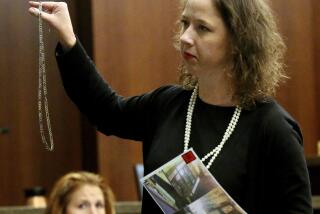Defendant Ordered to Trial in Attack on Amber Jefferson
- Share via
WESTMINSTER — A Municipal Court judge ordered an 18-year-old Stanton man to stand trial on felony assault charges Thursday for allegedly throwing a piece of glass that slashed Amber Jefferson’s face during a brawl last August.
After four days of pretrial testimony, Judge Michael Beecher ruled that there was ample evidence to bring Kurt David Wimberly to trial on the felony mayhem charges, although no one has admitted to seeing him throw the glass. The trial is scheduled to begin Dec. 13.
The charge stems from Wimberly’s involvement in an Aug. 6 fight outside his Stanton home that left the 15-year-old Garden Grove girl with a disfiguring scar that runs from her temple to her neck. Two misdemeanor assault charges against Wimberly were dropped because one of his alleged victims, a former friend of Amber’s who has since accused her of attempting to bribe him into changing his testimony, now says he was never assaulted.
Wimberly, who remains in custody in County Jail, is also charged with assault with a deadly weapon, infliction of bodily harm and battery charges.
According to authorities, as many as 12 people on both sides, some armed with bats and boards, took part in the fighting that allegedly stemmed from an argument between Wimberly’s former and current girlfriends.
Prosecutors contend that during the confrontation, an angry Wimberly threw an ashtray, a knife and then a glass shard from his patio, striking Amber in the face after one of her friends started breaking the windows in his home. After the near-fatal injury that sliced Amber’s face to the bone, she and her family charged that the attack was racially motivated, causing civil rights activists to rally around her.
Amber, the daughter of a black father and white mother, said her assailants had used racial slurs during the attack.
But the district attorney soundly rejected that claim, saying that the confrontation had nothing to do with race. During pretrial testimony, there was little evidence presented to suggest that race was a motive.
In earlier testimony, 17-year-old Matt Stewart--a friend of Amber’s who was with her the night of the incident--alleged that Amber had told him they each would receive $1,000 if they told authorities the attack was racially motivated. Amber denied Stewart’s claim.
On Thursday Rudy Garcia, a Sheriff’s Department homicide investigator, testified that a 13-ounce piece of glass from a window probably was used to injured Amber. Although blood samples taken from the glass matched Amber’s blood type, Garcia said that investigators did not find any fingerprints on the shard to directly tie it to Wimberly.
The hearing was highlighted by further testimony from Amber, a Santiago High School ninth-grader, who appeared in court for the second day in a row. Grilled by Wimberly’s attorney, Sal Ciulla, Amber appeared to have difficulty remembering past statements that she had made to authorities. During intense questioning, Ciulla repeatedly pointed out conflicting testimony that she is alleged to have given police over the past three months.
In his closing statements, Ciulla told the court that Amber either has “a bad memory or was flat-out lying.”
“She has a very convenient lapse of memory whenever it suits her story,” Ciulla said. “Anything that hurts her story, she just doesn’t want to remember.”
Ciulla’s questioning Thursday focused on inconsistencies in Amber’s testimony pertaining to who had thrown the object that slashed the left side of her face. Amber has maintained in court that on the night she was injured, she saw Wimberly holding a shiny glass object in his hand moments before she was struck, but that she did not see him throw it.
On Thursday, Ciulla questioned her about the truthfulness of that statement.
“Don’t you remember saying on that night that Kurt came up and hit you on your left side? Don’t you remember telling (the prosecutor) that you saw him throw it?” Ciulla asked. “ . . . Does your memory change day to day on this incident?”
Amber, who had broken into tears on the witness stand Wednesday, maintained her composure. “My memory has changed a lot, what memory I have,” she answered.
Assistant Dist. Atty. Kathi Harper attributes part of Amber’s inability to recall certain details to the many discussions that she and her companions have had about the case over the last several months.
“The biggest problem with this case is that the witnesses have all talked so much about it that it is difficult for them to keep their memories separate from what they have been told,” Harper said.
Yet despite confusing and often conflicting testimony presented by the prosecution witnesses, Harper said she remains convinced that the district attorney has a strong case.
“Kurt Wimberly was the person holding that glass just before Amber got hurt,” she said. “ . . . If I didn’t believe I had a good case, I wouldn’t have asked for a binder.”
More to Read
Sign up for Essential California
The most important California stories and recommendations in your inbox every morning.
You may occasionally receive promotional content from the Los Angeles Times.










